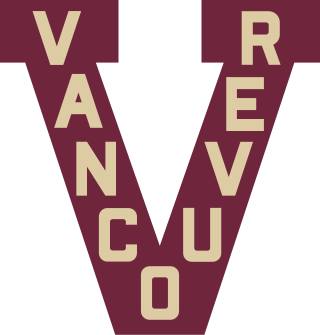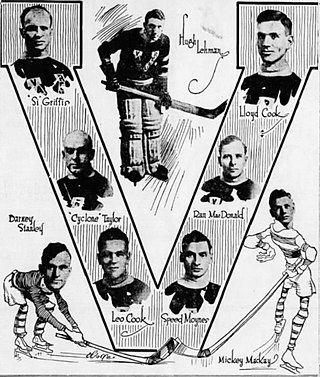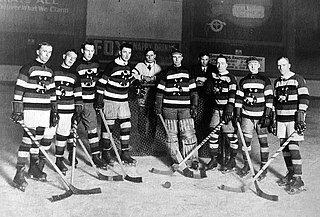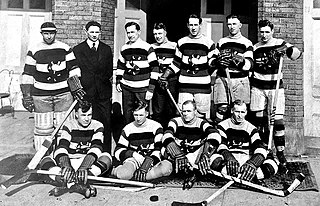The Pacific Coast Hockey Association (PCHA) was a professional ice hockey league in western Canada and the western United States, which operated from 1911 to 1924 when it then merged with the Western Canada Hockey League (WCHL). The PCHA was considered to be a major league of ice hockey and was important in the development of the sport of professional ice hockey through its innovations.
The 1917–18 NHL season was the first season of the National Hockey League (NHL) professional ice hockey league. The league was formed after the suspension of the National Hockey Association (NHA). Play was held in two halves, December 19 to February 4, and February 6 to March 6. The Canadiens won the first half, and Toronto the second half. The season was contested by four teams, down from six in the previous season, finishing with only three, in Montreal, Ottawa and Toronto. The Montreal Wanderers withdrew early in January 1918 after their rink, the Westmount Arena, burned down. Toronto won the NHL playoff and then won the Stanley Cup, by defeating the PCHA's Vancouver Millionaires three games to two in a best-of-five series.

The Vancouver Millionaires were a professional ice hockey team that competed in the Pacific Coast Hockey Association and the Western Canada Hockey League between 1911 and 1926. Based in Vancouver, British Columbia, they played in Denman Arena, the first artificial ice surface in Canada and the largest indoor ice rink in the world at the time it opened.
The Seattle Metropolitans were a professional ice hockey team based in Seattle, Washington, playing in the Pacific Coast Hockey Association (PCHA) from 1915 to 1924. During their nine seasons, the Metropolitans were the PCHA's most successful franchise, as they went 112–96–2 in their nine years as a franchise. The Metropolitans also won the most regular season PCHA championships, winning five times, with Seattle finishing second on three other occasions. The Metropolitans played their home games at the 2,500 seat Seattle Ice Arena located downtown at 5th and University.
The 1921–22 NHL season was the fifth season of the National Hockey League (NHL). Four teams each played 24 games. The league dropped the split season and the two top teams played off for the league championship. The second-place Toronto St. Patricks defeated the first-place Ottawa Senators for the league championship.

Frank Corbett "Flash" Foyston was a Canadian professional ice hockey player and coach. Foyston was a member of Stanley Cup championship teams three times: with the Toronto Blueshirts in 1914, the Seattle Metropolitans in 1917, and the Victoria Cougars in 1925. While with the Metropolitans, he twice led the Pacific Coast Hockey Association (PCHA) in goals. After his retirement from playing, Foyston became a minor league head coach. He was inducted into the Hockey Hall of Fame in 1958.

John Phillip "Jack" Walker was a Canadian professional ice hockey forward who played for the Toronto Blueshirts, Seattle Metropolitans, Victoria Cougars, and Detroit Cougars. He played in all the big professional leagues at the time: the National Hockey Association (NHA), Pacific Coast Hockey Association (PCHA), Western Canada Hockey League (WCHL), and National Hockey League (NHL).
The 1917 Stanley Cup Finals was contested by the Pacific Coast Hockey Association (PCHA) champion Seattle Metropolitans and the National Hockey Association (NHA) and Stanley Cup defending champion Montreal Canadiens. Seattle defeated Montreal three games to one in a best-of-five game series to become the first team from the United States to win the Cup. The series was also the first Stanley Cup Finals to be played in the United States, and the last Stanley Cup Finals to not feature a National Hockey League team, as the NHA rebranded as the NHL in November 1917.
The 1918 Stanley Cup Finals was contested by the National Hockey League (NHL) champion Toronto and the Pacific Coast Hockey Association (PCHA) champion Vancouver Millionaires. In a series held entirely in Toronto, the Toronto team won the series by three games to two in the best-of-five game series to win the Stanley Cup. It was the first series contested by the new NHL and subsequently the first Stanley Cup win by the Toronto NHL franchise team.
The 1919 Stanley Cup Finals was the ice hockey playoff series to determine the 1919 Stanley Cup champions. The series was cancelled due to an outbreak of Spanish flu after five games had been played, and no champion was declared. It was the only time in the history of the Stanley Cup that it was not awarded due to a no-decision after playoffs were held.
The 1920 Stanley Cup Finals was contested by the National Hockey League (NHL) champion Ottawa Senators and the Pacific Coast Hockey Association (PCHA) champion Seattle Metropolitans. The Senators won the series by three games to two in the best-of-five game series. Although all of the games for the series were scheduled to be played at The Arena in Ottawa, unseasonably warm weather and poor ice conditions forced the last two contests to be played on the artificial ice at Toronto's Arena Gardens.
The 1921 Stanley Cup Finals was contested by the National Hockey League (NHL) champion Ottawa Senators and the Pacific Coast Hockey Association (PCHA) champion Vancouver Millionaires. The Senators defeated Vancouver three games to two in the best-of-five game series to become the first team to win back-to-back Cup championships since the 1912/1913 Quebec Bulldogs.
The 1922 Stanley Cup playoffs concluded on March 22 when the National Hockey League (NHL) champion Toronto St. Patricks defeated the Pacific Coast Hockey Association (PCHA) champion Vancouver Millionaires in the final series, three games to two. With the debut of the Western Canada Hockey League (WCHL) at the start of the season, these playoffs marked the first time that the NHL, the PCHA, and the WCHL all competed for the Cup.
The 1922 Stanley Cup Finals was contested by the National Hockey League (NHL) champion Toronto St. Patricks and the Pacific Coast Hockey Association (PCHA) champion Vancouver Millionaires. The St. Pats defeated Vancouver three games to two in the best-of-five game series to win their only Stanley Cup as the St. Pats.

The 1917–18 PCHA season was the seventh season of the professional men's ice hockey Pacific Coast Hockey Association league. Season play ran from December 28, 1917, until March 8, 1918. The season was reduced to 18 games per team. The Seattle Metropolitans club would be regular-season PCHA champions, but lost the play-off to the Vancouver Millionaires. The Millionaires then played in the Stanley Cup Finals series against Toronto, the NHL champions. Toronto won the best-of-five series 3-2 to win the Cup.

The 1919 PCHA season was the eighth season of the professional men's ice hockey Pacific Coast Hockey Association league. Season play ran from January 1 to March 10. The season was increased to 20 games per team.

The 1919–20 PCHA season was the ninth season of the professional men's ice hockey Pacific Coast Hockey Association (PCHA) league. Season play ran from December 26, 1919, to March 10, 1920. The season was enlarged to 22 games per team. The Seattle Metropolitans club finished first during the regular season and then won the playoff with the Vancouver Millionaires to take the PCHA championship. The Mets then played in the 1920 Stanley Cup Finals against the National Hockey League (NHL) champion Ottawa Senators. The Senators won the best-of-five series three games to two.

The 1921–22 PCHA season was the 11th season of the professional men's ice hockey Pacific Coast Hockey Association league. Season play ran from December 5, 1921, until February 24, 1922. The season was enlarged to 24 games per team. The Seattle Metropolitans were the regular-season PCHA champions, but lost the play-off with Vancouver Millionaires.

The 1917–18 Toronto Hockey Club season was the first season of the new Toronto franchise in the newly-organized National Hockey League (NHL). The team was intended as a 'temporary' franchise, operating without an official club nickname and without a formal organization separate from the Toronto Arena Company that managed the Arena Gardens. Despite this, the team came together to win the first NHL Championship, competing against existing teams that had transferred directly from the National Hockey Association (NHA). Toronto would go on to win the Stanley Cup by defeating the Pacific Coast Hockey Association champion Vancouver Millionaires – the first Stanley Cup for an NHL team and the second Cup for a Toronto team after the Toronto Blueshirts' victory in the 1913–14 season of the NHA. To this day, the Toronto Arenas are the only team in the four major North American sports to win the title in their first season as a franchise.

Thomas Wilfred "Smokey, Fred" Harris was a Canadian professional ice hockey player. Harris played in the Pacific Coast Hockey Association (PCHA), the National Hockey League (NHL) and the Western Canada Hockey League (WCHL). Harris was born in Port Arthur, Ontario. His brother Henry was also a professional ice hockey player. Harris scored the first goal in Boston Bruins' franchise history.









